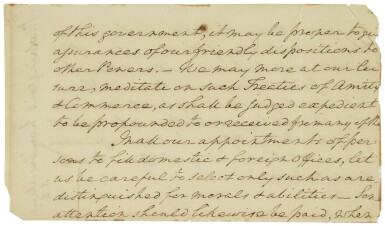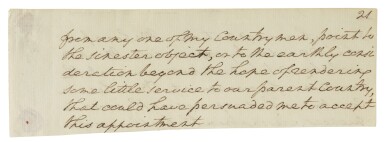WASHINGTON, George. Autograph manuscript "General Orders" for the Continental Army, Newburgh, New York, 30 August 1782. 4 pages, small folio, plus an additional half sheet (marked with an asterisk) by Washington) to interpolate a 13-line insertion (verso blank) . A draft: the text with about 5 corrections, cross-outs or interlinear additions. Tears and slight losses along the central vertical fold, catching a letter at the beginning or end of some lines, the damage neatly patched. WAITING FOR NEWS OF THE TREATY OF PARIS, WASHINGTON ORDERS THE CONTINENTAL ARMY TO CROSS THE HUDSON ONE MORE TIME A great rarity: draft Revolutionary War General Orders for a major movement of the Continental Army, entirely in Washington's hand. Washington and most of his Army had been encamped in the Hudson Highlands for some time, awaiting the return of Rochambeau and his army from Yorktown. At the end of August, Washington "moved his Army by water to Verplank's in order that French and Americans might cooperate quickly in event of sudden advance by the British" (Freeman 5:422). During the course of seven years of war, Washington drafted and issued hundreds of detailed General Orders. These covered a spectrum of matters: designated officers of the day, established passwords and responses, planned encampments, specified order of march, assigned commanders, confirmed courts-martial and announced significant battles and events. Most are known today only from secretarial copies prepared by aides, or through the Varick transcripts in the Library of Congress. Only a very few drafts in the Commander's hand survive. The complexity of moving even a modest army (five brigades in this instance) to a landing place, with baggage, onto boats and across a major waterway is apparent in the details of Washington's orders: "Precisely at 5 o'clock Tomorrow Morning the General [quarters, a drum cadence] is to beat, on which the Tents and Baggage of the two Connecticut, and three Massachusetts Brigades, are to be put into the Batteaux. At seven o'clock, the assembly will beat, when these Brigades are immediately to March, and Embark...proceeding in one Column to Verplanks Point [a key ferry landing, opposite Stony Point, below West Point]..." Washington lists the order in which the Brigades are to proceed, then specifies careful separation between units: "The Leading Regiment of the first Connecticut Brigade is to advance 200 yards as a vanguard..." once embarked, "the Boats of each Regiment are to keep a Breast; and far enough apart to prevent interference. The Companies will Embark as they are formed on the Parade..." The officers' roles are spelled out: "Generals, and Officers commanding Divisions and Brigades, are to be at the head of their respective Corps..." And, "as soon as the Troops have Embarked...the rear Brigade will [b]eat a March...three cannon will then be fired from the Park at Westpoint and the Columns will immediately get in motion, the Music [bands] of different Regiments playing alternatively, if the situation of the Beats will admit of it. The Inspector of Music will regulate the Beats." Potential problems are considered: "If any Boat shall prove too leaky, break its Oars, or from any other cause is unable to keep the line, it is to turn out and follow after.... No Batteau is to be without a Commissioned Officer in it," he directs, and "No Women" are "to be admitted into t[he] Boats with the Troops on any pretence [ sic ] whatsoever." If there are too many to embark without overloading "the surplusage must mar[ch] by Land...." The soldiers are warned "to fill their Cantee[ns] before they Embark, as there will be no land for Water afterwards." Flag signals are described in considerable detail, as the best way for units to communicate: "If any Brigade or Regmt....is unable to keep up, the Brigadier commanding it,...will cause a white Flag to be hoisted in the Boat where he is;...if the rear would have the Front move faster, a Blue Flag is to
WASHINGTON, George. Autograph manuscript "General Orders" for the Continental Army, Newburgh, New York, 30 August 1782. 4 pages, small folio, plus an additional half sheet (marked with an asterisk) by Washington) to interpolate a 13-line insertion (verso blank) . A draft: the text with about 5 corrections, cross-outs or interlinear additions. Tears and slight losses along the central vertical fold, catching a letter at the beginning or end of some lines, the damage neatly patched. WAITING FOR NEWS OF THE TREATY OF PARIS, WASHINGTON ORDERS THE CONTINENTAL ARMY TO CROSS THE HUDSON ONE MORE TIME A great rarity: draft Revolutionary War General Orders for a major movement of the Continental Army, entirely in Washington's hand. Washington and most of his Army had been encamped in the Hudson Highlands for some time, awaiting the return of Rochambeau and his army from Yorktown. At the end of August, Washington "moved his Army by water to Verplank's in order that French and Americans might cooperate quickly in event of sudden advance by the British" (Freeman 5:422). During the course of seven years of war, Washington drafted and issued hundreds of detailed General Orders. These covered a spectrum of matters: designated officers of the day, established passwords and responses, planned encampments, specified order of march, assigned commanders, confirmed courts-martial and announced significant battles and events. Most are known today only from secretarial copies prepared by aides, or through the Varick transcripts in the Library of Congress. Only a very few drafts in the Commander's hand survive. The complexity of moving even a modest army (five brigades in this instance) to a landing place, with baggage, onto boats and across a major waterway is apparent in the details of Washington's orders: "Precisely at 5 o'clock Tomorrow Morning the General [quarters, a drum cadence] is to beat, on which the Tents and Baggage of the two Connecticut, and three Massachusetts Brigades, are to be put into the Batteaux. At seven o'clock, the assembly will beat, when these Brigades are immediately to March, and Embark...proceeding in one Column to Verplanks Point [a key ferry landing, opposite Stony Point, below West Point]..." Washington lists the order in which the Brigades are to proceed, then specifies careful separation between units: "The Leading Regiment of the first Connecticut Brigade is to advance 200 yards as a vanguard..." once embarked, "the Boats of each Regiment are to keep a Breast; and far enough apart to prevent interference. The Companies will Embark as they are formed on the Parade..." The officers' roles are spelled out: "Generals, and Officers commanding Divisions and Brigades, are to be at the head of their respective Corps..." And, "as soon as the Troops have Embarked...the rear Brigade will [b]eat a March...three cannon will then be fired from the Park at Westpoint and the Columns will immediately get in motion, the Music [bands] of different Regiments playing alternatively, if the situation of the Beats will admit of it. The Inspector of Music will regulate the Beats." Potential problems are considered: "If any Boat shall prove too leaky, break its Oars, or from any other cause is unable to keep the line, it is to turn out and follow after.... No Batteau is to be without a Commissioned Officer in it," he directs, and "No Women" are "to be admitted into t[he] Boats with the Troops on any pretence [ sic ] whatsoever." If there are too many to embark without overloading "the surplusage must mar[ch] by Land...." The soldiers are warned "to fill their Cantee[ns] before they Embark, as there will be no land for Water afterwards." Flag signals are described in considerable detail, as the best way for units to communicate: "If any Brigade or Regmt....is unable to keep up, the Brigadier commanding it,...will cause a white Flag to be hoisted in the Boat where he is;...if the rear would have the Front move faster, a Blue Flag is to



.jpg)











Try LotSearch and its premium features for 7 days - without any costs!
Be notified automatically about new items in upcoming auctions.
Create an alert